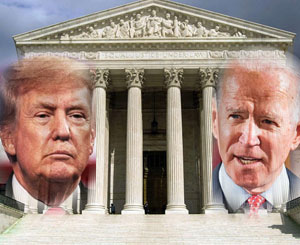Executive Privilege

The decision by the U.S. Supreme Court, in a brief unsigned opinion, dealt former President Trump a significant setback in his quest to slow down the work of the House committee, which is probing his role, among its broader scope, in last year’s attack at the Capitol. While it appears that the ruling provides the final legal word in Mr. Trump’s challenge to the release of the documents, the decision specifically notes that its impact is limited to this case.
“The questions whether and in what circumstances a former president may obtain a court order preventing disclosure of privileged records from his tenure in office, in the face of a determination by the incumbent president to waive the privilege, are unprecedented and raise serious and substantial concerns,” the court said. It added that the U.S. Court of Appeals for the D.C. Circuit, which ruled in favor of the committee in December 2021, did not decide this issue “because it analyzed and rejected President Trump’s privilege claims ‘under any of the tests [he] advocated’.”
“Because the court of appeals concluded that President Trump’s claims would have failed even if he were the incumbent, his status as a former president necessarily made no difference to the court’s decision,” the Supreme Court said, with only Justice Clarence Thomas dissenting.
The court battle was set up last September when White House press secretary Jen Psaki responded to a question, saying, “President (Biden) has already concluded that it would not be appropriate to assert executive privilege” and protect Trump’s presidential documents, held by the National Archives and Records Administration, from going to the House committee.
In court, Trump challenged the House committee’s request, saying the investigation exceeds Congress’ constitutional power. He also contends a 1978 statute to warehouse and release the records of former presidents is unconstitutional because it restricts his ability as a former president to exercise his right of executive privilege.
On Nov. 9, U.S. District Court Judge Tanya S. Chutkan in Washington, D.C., cleared the way for their release. Her 39-page ruling cited the public interest and said the former president “is unlikely to succeed on the merits of his claims.” A month later, the three-judge appeals court panel rejected his appeal.
While executive privilege itself is not mentioned in the U.S. Constitution, courts have found it is rooted in the separation of powers doctrine that divides the power of the U.S. government into legislative, executive and judicial branches.
The modern doctrine for executive privilege stems from a 1974 Supreme Court decision that forced then-President Richard Nixon to turn over the Watergate tapes to Congress. Chief Justice Warren Burger, writing for the majority in a 9-0 decision, said, “Absent a claim of need to protect military, diplomatic or sensitive national security secrets, we find it difficult to accept the ...[absolute] confidentiality of presidential communications.”
Nixon complied, which ultimately led to his resignation in disgrace within a few weeks. But later, as a former president, he cited historical practice and an attorney general opinion that all official documents and recordings from his time in the White House were his personal possessions when he revealed plans to destroy many of them.
Congress responded by enacting the Presidential Recordings and Materials Preservation Act of 1974, which was aimed at Nixon and placed his presidential records in federal custody to prevent their destruction. Three years later in what some call Nixon II, the U.S. Supreme Court upheld the act and ruled the separation of powers is not violated by the seizure and examination of records related to a former president that are still within the control of the executive branch. The decision also noted that President Gerald Ford signed the act, and that the Carter administration defended it.
The 7-2 majority opinion, written by Justice William Brennan, did say that executive privilege “survives the individual president’s tenure” and that “a former president may also be heard to assert” these claims. But the court placed several caveats on the privilege, saying executive privilege does not apply when there is a compelling need for the information, such as a criminal investigation.
The next year, Congress tightened control of a former president’s papers through the Presidential Records Act (PRA) of 1978. Under the PRA, the legal ownership of the official records of the president was transferred from presidents themselves to the federal government, and the law established a new statutory structure to manage records. The broad collection of covered documents includes presidential communications, internal deliberations, law enforcement materials, national security information and attorney-client information.
In supporting the Supreme Court’s majority opinion, Justice Brent Kavanaugh said former presidents must retain some executive privilege. But he cited the D.C. appeals court ruling that “concluded that the privilege claim at issue here would not succeed even under the Nixon” and previous tests.
Posted 11/17/2021, Revised 12/10/2021 and 1/21/2022
Other Fact-Checked Subjects:
- Hate Speech
- Flag Burning
- Pardons
- Affirmative Action
- Free Speech
- Ninth Circuit
- Forced Evacuation
- Executive Orders
- National Anthem Controversy
- Gun Laws
- Broadcast Licenses
- Revoking Visas
- Non-Citizen Terrorist Cases
- Religious Displays
- Congressional Seating
- Sexual Harassment
- Revoking Citizenship
- Influencing U.S. Elections
- Legal View of Treason
- Chain Migration
- Guns and Courts
- Students' Right to Protest
- Attorney-Client Privilege
- Recusal
- The President and the Law
- Immigrant Rights
- Revoking Security Clearances
- Confidentiality Agreements
- Resigned or Fired
- Deadly Force
- Birthright Citizenship
- Press Credentials
- Troops at the Border
- Election Re-Vote
- Emergency Powers
- Immigration Law
- Contempt of Congress
- Boycotting 2020 Census
- Electoral College
- Impeachment
- Separation of Powers
- Equal Rights Amendment
- Whistleblower Protection
- Pandemic Authority
- State Powers
- Employer Limits
- Police Immunity
- Federal Forces
- Hatch Act
- Attorney General Authority
- Frivolous Lawsuits
- Social Media and the First Amendment
- D.C. Statehood
- Executive Privilege
- Russian Sanctions
- Law of Genocide
- Stare Decisis
- Declassified




